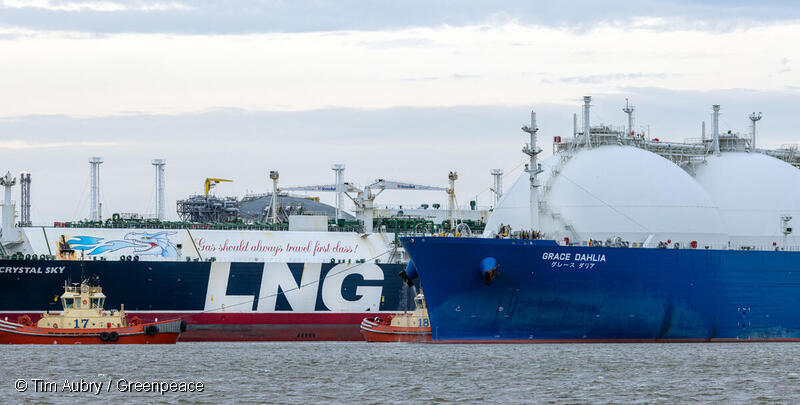New research from Greenpeace USA examines the DOE’s most routinely cited economic and environmental studies, and the cottage consulting industry providing the basis for the DOE’s rulemaking process.

The standards used to evaluate LNG export applications have never been clearly articulated to the public, drawing skepticism from environmental justice advocates and frontline communities impacted by the LNG industry.
New research from Greenpeace USA takes a closer look at the series of economic and environmental studies commissioned by the DOE and authored by LNG industry consultants and insiders. The DOE has consulted with a notorious corporate polluter consultancy with a history of twisting science for corporate clients including producing analysis determining no linkages between tobacco advertising and popularity of smoking. Despite potential conflicts of interest, these foundational studies have been used over the past decade to green light LNG terminals and rationalize the rapid scaling up of U.S. LNG exports.

Tug boats move the LNG tanker Grace Dahlia past the LNG Tanker Stena Crystal Sky as it departs from the Cheniere Liquified Natural Gas Facility in Sabine Pass, Texas.
The oil and gas industry’s “go-to” economists W. David Montgomery and Paul Bernstein, authored the 2012 and 20181 economic studies most routinely cited by the Department of Energy. Montgomery and Berstien were formerly employed by the American Petroleum Institute to author studies that aligned with the fossil fuel industry’s interest in delaying climate policies. In addition, the DOE relies on a 2019 environmental study from KeyLogic Systems which had overlapping business with the LNG industry sometime between 2017 and 2020.* Three of the five KeyLogic report authors are now directly employed within the gas industry at Saudi Aramco, GTI Consulting and with Cheniere, the United States’ largest LNG exporter. The lead investigator of the KeyLogic study previously worked for a company actively opposing the LNG pause recently announced by the Biden administration and is now employed by the DOE.
The apparent conflicts of interest surrounding the authors of these supposedly neutral and unbiased economic and environmental reports ultimately highlight the flawed reasoning underscoring the DOE utilizing these studies as the basis for new LNG export approvals. The 2019 environmental study and a DOE-commissioned study from 2014 have both been challenged for lowballing methane leakage estimates throughout LNG supply chains, effectively downplaying the overall climate impacts of LNG. The studies also faced scrutiny for failing to account for how upscaled LNG exports could increase total overall fossil fuel use.
The recent pause in authorizing new LNG export facilities has prompted renewed calls for updated DOE LNG analysis and stronger transparency. The Biden administration’s recent actions signal an understanding of the previous inadequacies of the DOE LNG policy rulemaking system. The time is right for DOE stop using outdated studies authored by consultants with close ties to the gas industry in favor of a transparent review process that accounts for frontline community input and unbiased science held to the highest of standards. Specifically, the DOE must include full participation from DOE offices beyond Fossil Energy & Carbon Management Programs, and facilitate an inclusive process with participation from environmental justice communities and key stakeholders beyond the oil and gas industry to ensure credible, climate-safe outcomes.
Read the new research from Greenpeace USA to discover the extent to which the DOE has used gas industry insiders and consultants to build the case for soaring LNG exports.
If learning about DOE’s close ties to the web of fossil fuel industry influence has you miffed, don’t despair. Take action with Greenpeace USA by urging the DOE to implement a fair and unbiased process for reviewing new LNG projects.
For further information
This analysis is published by Greenpeace USA. Research contributed by Andres Chang and Tim Donaghy. March 2024.
1 See, for example, citations in Sabine Pass (2015), Freeport LNG (2016), Corpus Christi (2016), and Magnolia (2022).
*exact dates unknown


